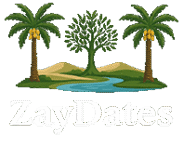
Introduction: Why Compliance Matters for Importers
In the world of agricultural imports, compliance is non-negotiable. A shipment of premium Deglet Noor dates or extra virgin olive oil may be flawless in quality, but without the proper paperwork, it risks costly delays or outright rejection at customs. Importers know this pain well: one missing form can cause weeks of delay and thousands of dollars in storage charges.
At ZayDates, we recognize that one of the biggest hurdles for international buyers isn’t the product itself — it’s the bureaucracy, documentation, and export compliance that come with cross-border trade. That’s why we take full responsibility for handling every required certificate and approval before your shipment even leaves Algeria.
What is a Phytosanitary Certificate?
The phytosanitary certificate is the single most critical document for agricultural exports.
- Definition: An official document issued by Algeria’s Ministry of Agriculture, confirming that the shipment is free from pests, diseases, and contaminants that could threaten plant health in the destination country.
- Purpose: Protects importing countries from introducing harmful organisms that can damage crops or ecosystems.
- Scope: Covers fruits (such as Deglet Noor dates), vegetables, seeds, and, in some cases, processed products.
Without a phytosanitary certificate, most customs authorities will not release agricultural shipments. In fact, many countries, including the U.S., Canada, and EU member states, require it as a mandatory condition of entry.
Other Essential Export Documents
While the phytosanitary certificate is critical, it’s only part of a broader export compliance package. Typical documents include:
- Certificate of Origin – Confirms the country of production (Algeria), which is vital for tariffs and trade agreements.
- Health Certificate – Confirms that the shipment meets food safety and hygiene standards.
- Commercial Invoice & Packing List – Provides details of product type, grade, quantity, and value.
- Bill of Lading or Air Waybill – Confirms transport details and ownership.
- Insurance Documents (for CIF shipments) – Proof of coverage during transit.
ZayDates bundles all of these together so importers never face a surprise at customs.
Common Importer Pain Points
Through years of trade, we’ve seen the same challenges come up repeatedly for importers:
- Paperwork Errors – A slight mismatch (like weight differences between invoice and packing list) can result in weeks of delay.
- Changing Regulations – Each market has its own rules; the EU, North America, and the Middle East often update their requirements.
- Port Bureaucracy in Algeria – Complex steps at departure ports can confuse even experienced importers.
- Language Barriers – Many Algerian exporters lack English or French export documentation, leaving importers to navigate translations themselves.
How ZayDates Simplifies Compliance
We’ve built our business model around removing these headaches. When you partner with ZayDates:
- We handle all certifications directly with Algerian authorities.
- We prepare multilingual documentation (Arabic, French, and English) for smooth clearance worldwide.
- We guarantee phytosanitary certification with every shipment of dates and olive oil.
- We align with your market requirements, whether it’s FDA registration for the U.S., EU hygiene standards, or Canadian Food Inspection Agency (CFIA) rules.
- We ensure packaging and labeling compliance for industrial, wholesale, or retail-ready shipments.
With us, importers focus on building their business — not on chasing paperwork.
Example: Avoiding Costly Delays
Consider an importer in Europe sourcing Deglet Noor dates. Their previous supplier failed to secure a correct phytosanitary certificate. Customs seized the shipment, requiring third-party testing and additional documentation, resulting in three weeks of delay and extra storage costs.
By contrast, ZayDates shipments arrive with all compliance checks complete. Our direct coordination with the Ministry of Agriculture ensures that documents are issued before the shipment even reaches the port, eliminating the risk of last-minute rejections.
Why Compliance is a Competitive Advantage
Many importers see documentation as a hassle, but in reality, it’s a competitive advantage when done right:
- Faster customs clearance means fresher products for your customers.
- Reduced risks of fines, delays, or rejected goods.
- Stronger trust with retailers and distributors who demand compliance.
- Proof of reliability that enhances your brand reputation.
By making compliance seamless, ZayDates helps importers win repeat contracts and expand market share.
Phytosanitary Certificates and Olive Oil
Although often associated with fruits and plants, shipments of olive oil also require documentation to prove adherence to hygiene and safety standards. While not always a “phytosanitary” certificate in the strict sense, similar health and conformity certificates are mandatory for customs clearance in most importing countries.
ZayDates ensures olive oil shipments carry:
- Health and hygiene certificates.
- Certificate of origin (Algeria).
- Full compliance with packaging, bottling, and labeling rules in the buyer’s market.
Conclusion: Compliance Without the Headache
At ZayDates, we know our clients aren’t just buying Deglet Noor dates and extra virgin olive oil — they’re buying peace of mind. With our deep family roots in Algerian farming and our hands-on export expertise, we handle the paperwork so you don’t have to.
When you partner with us, you bypass the bureaucracy, language barriers, and port headaches that frustrate many importers. Instead, you receive shipments that are certified, compliant, and ready for market.
Contact ZayDates today to request a compliance-ready quote and discover how easy importing from Algeria can be.
